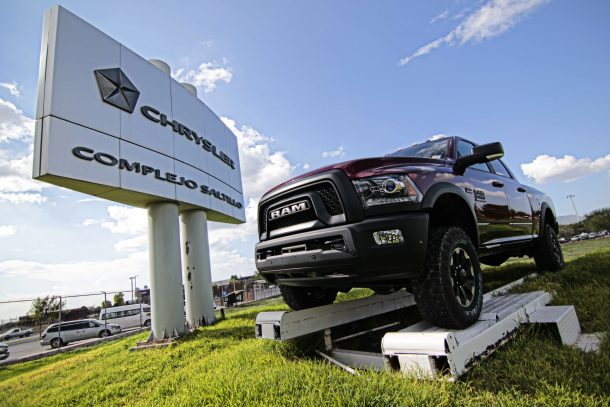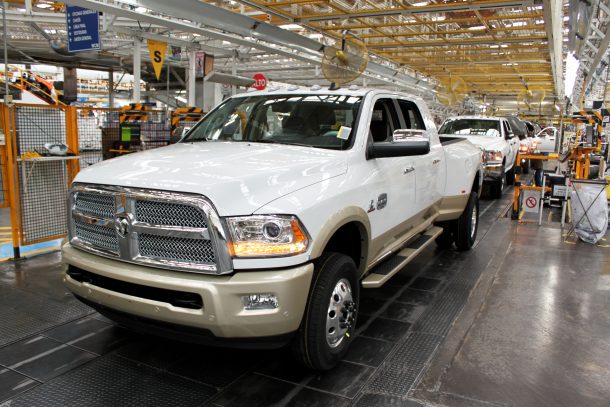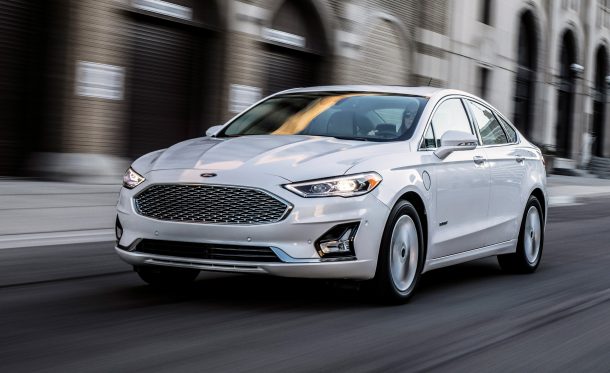#Mexico
Mexican Tariffs Off the Table Following Border Deal
The United States maintained the threat of tariffs on Mexican goods until Friday night, less than three days before a 5 percent levy was poised to hit incoming products from south of the border. It seems the pressure worked, with the U.S. and Mexico signing a deal late Friday to prevent both tariffs and the northward flow of illegal migrants from Central America.
Automakers are no doubt breathing a sigh of relief.
As Mexico Beefs Up Its Border, Tariffs Still Lurk on Monday
Friday brought a third day of talks aimed at preventing a U.S.-imposed tariff on Mexican goods. Late last month, the White House warned that a 5 percent import levy would hit Mexican goods on June 10th, rising to 10 percent by July and 25 percent by October, if Mexico doesn’t stem the flow of illegal migrants travelling through its country to reach the U.S.
Going into the weekend, the threat still stands. There are, however, signs of progress both from the U.S. and its southern neighbor.
Automakers, Already Taking a Hit From Trump's Mexican Tariff Threat, Worry the Pain Has Only Just Begun
The profit-focused appeal of building vehicles in low-cost jurisdictions propelled many automakers to boost manufacturing capacity in America’s southern neighbor — a decision that now haunts them.
After President Donald Trump issued a Thursday statement declaring his administration would levy a 5 percent tariff on all Mexican-made goods starting June 10th, some $17 billion in market value evaporated from top automakers the following day. Ford, General Motors, and Fiat Chrysler all saw their share prices tumble. Should Trump follow through on his promise of an escalating tariff (a threat designed to stem illegal migration into the U.S.), the pain felt by both companies and their customers will be extreme.
Naturally, the industry is pushing back the best it can.
Trump Promises Tariffs on All Mexican Goods Starting June 10th
Just when it seemed the trade climate in the North American region was easing, President Donald Trump launched a new salvo late Thursday, promising a 5 percent levy on all Mexican goods crossing the U.S. border if the country doesn’t stem the flow of illegal migrants.
The tariff would land on all Mexican goods on June 10th, ramping up to 10 percent on July 1 before topping out at 25 percent by October. For automakers and those who sell (and buy) the final product, the prospect of a new import levy is the stuff of nightmares.
Border Backups Follow Trump's Closure Threat
Far away from most American cities, and unbeknownst to most consumers, a transportation bottleneck is stemming the flow of goods from Mexico to the United States.
Major border backups plagued Mexico-U.S. crossings this week, the result of threats made last week by President Donald Trump. While the president eventually backed off after suggesting the U.S. may resort to closing the border in order to stem the flow of migrants into the country, companies didn’t waste time shoehorning as much product into trucks as possible, eager to get their goods across the border.
This, coupled with a mass transfer of U.S. Customs and Border Protection officers from commercial to immigration duties, sent wait times soaring. For automakers (and avocado sellers), this could be a problem.
How Seriously Should We Take Trump's Mexican Auto Tariff Threat?
On Thursday, President Donald Trump threatened to impose tariffs on cars entering the United States from Mexico if the nation doesn’t assist Washington in dealing with the migrant situation at its southern border. It’s a rather bold ultimatum, coming hot on the heels of claims that the White House was seriously considering closing the border entirely if Mexico could not curtail the flow of illegal immigrants and drugs heading north.
It’s an interesting situation, especially considering both outcomes would upend the automotive industry. But Trump argues that the growing reliance on Mexican manufacturing and proliferation of illegal immigrants has already hurt the United States badly. A contentious stance, for sure, but these are issues in need of thorough discussion. Gallup polls repeatedly peg immigration as one of the issues voters care most about — along with healthcare and the economy.
However, we only care about those things tangentially. It’s all about the cars for us.
Border Hopper Unceremoniously Removed From Comerica Park
You can see Canada from the top of Detroit’s Comerica Park, but the warm, low-labor-cost lands south of the Rio Grande lie far below the horizon. It’s not surprising that, as workers at a General Motors plant sitting just 3.5 miles from Comerica prepare for possible closure and job loss, GM’s decision to prominently feature a new Mexican-built vehicle at the stadium ruffled feathers on both sides of the U.S.-Canada border.
On Saturday, the controversial newcomer was quietly whisked away.
Ford's Fusion, a Popular Drug Mule, Is Still At It
Ford’s Fusion sedan has found itself in the headlines for illicit cross-border shipments before, and you know what they say about history repeating.
Regarded as the delivery vehicle of choice after caches of Mexican marijuana were found in U.S.-market models built at Ford’s Hermosillo plant, the sedan’s unlikely double life continues apace. Cartel operatives continue using the model in their smuggling operation, recently shipping a different type of drug to a country with absolutely no use for extra marijuana.
Building a Wall: Unifor Announces Boycott of Mexican-made GM Vehicles
Two days after blockading roads leading to General Motors’ Canadian headquarters, autoworkers union Unifor rolled out an invisible wall to be placed between Canadians and GM vehicles built south of the Rio Grande.
The union’s call to boycott Mexican-made GM products doesn’t come as a surprise; Unifor president Jerry Dias threatened it in the past as a way of prodding corporate bosses in Detroit to keep the century-old Oshawa, Ontario assembly plant open. With the union now escalating its protest action, the boycott call is out. GM Canada isn’t happy about it, claiming it will only end up hurting Canadian workers.
General Motors Now Mexico's Top Automaker, UAW/Unifor Decidedly Annoyed
As General Motors takes aim at its own foot in the United States, it’s managed to become Mexico’s top automaker by volume. The company saw a nearly 3 percent U.S. decline in the fourth quarter of 2018, during which it announced the shuttering of several U.S. and Canadian facilities as part of a widespread restructuring program aimed at freeing capital for autonomous and electric vehicle development.
Meanwhile, large investments in its Mexican plants over the last few years — coming at the same time as rival Nissan’s scaling back of sedan production — has left GM as the top dog in the region. General Motors and Nissan have spent decades jousting for the top spot south of the border, alternating positions “depending on what has happened in their production levels,” according to Stephanie Brinley, principal analyst at IHS Markit.
Mexi Spec: BMW 2 Series Production Likely Moving South of the Border
While the current-generation BMW 2 Series isn’t ready for the grave, the company intends to put its next incarnation into assembly by 2021. That’s ages away for a consumer but precious little time for an automaker to make production decisions.
Likely spooked by potential trade issues looming over the horizon, BMW is reportedly considering shifting the America-bound 2 Series to a Mexican plant — specifically, the company’s new San Potosi facility, home of the new 3 Series.
Enter Number Two? Fiat Chrysler Boss Mulls U-turn on Ram HD Production
In a bid to leapfrog General Motors in pickup sales, Fiat Chrysler Automobiles CEO Mike Manley now claims his company’s Saltillo, Mexico assembly plant might continue cranking out heavy-duty Ram trucks after the next-generation model arrives.
Back in January, with the U.S. threatening steep tariffs on Mexican-made vehicles, FCA announced it would move Ram HD production to Warren, Michigan. The automaker promised $1 billion to Warren Truck Assembly to make it happen. Now, with a free trade agreement in place between the U.S. and Mexico, Manley says he doesn’t care where the trucks come from, so long as Americans choose them over FCA’s rivals.
Adios, Amigo? Honda Considering Moving Fit Production Out of Mexico, Report Says
It’s rumored that Honda is considering reallocating production of its U.S.-market Fit subcompact to Japan from Mexico in a few years. According to reports, this is partly due to everything that’s going on with the North American Free Trade Agreement, or whatever they’re calling it now.
The new arrangement, which replaces NAFTA, is set to raise the minimum North American content for cars to qualify for duty-free market access to 75 percent from 62.5 percent, while simultaneously raising Mexico’s auto workers’ minimum wage and giving them the right to union representation.
NAFTA Is Dead; All Hail the USMCA
Following some furious 11th hour bargaining, Canada reached an agreement with U.S. trade negotiators Sunday night, marking the end of the North American Free Trade Agreement (NAFTA) and the creation of its successor, the U.S.-Mexico-Canada Agreement. USMCA, for short.
While some of the finer details have yet to be released, the trilateral trade deal prevents the nightmare scenario of heavy tariffs levied on vehicles imported from Canada. To keep General Motors, Fiat Chrysler, Ford, Honda, and Toyota plants humming, officials in the Great White North reluctantly offered up some milk and cheese.
NAFTA No More: U.S. Reaches Deal With Mexico, Puts Pressure on Canada [Updated]
President Donald Trump announced a trade “understanding” with Mexico on Monday — not to be confused with an official deal — that would lead to an overhaul of the North American Free Trade Agreement. Trump made the announcement from the Oval Office, with Mexican President Enrique Pena Nieto listening in by speakerphone.
While it’s still too early to show up in a Lockheed S-3 Viking and tell the world “mission accomplished,” the announcement is the most overt example of progress on NAFTA we’ve seen. Interesting, considering it seemed as if Trump was openly calling for its death during the meeting.
Earlier in the day, Mexican officials said trade talks with the U.S. had concluded, adding that an announcement could come later in the day. The White House confirmed the reports an hour later on its government website, with Donald Trump stating there was a “big deal looking good with Mexico” via twitter.

















![NAFTA No More: U.S. Reaches Deal With Mexico, Puts Pressure on Canada [Updated]](https://cdn-fastly.thetruthaboutcars.com/media/2022/06/30/8798011/nafta-no-more-u-s-reaches-deal-with-mexico-puts-pressure-on-canada-updated.jpg?size=720x845&nocrop=1)












Recent Comments